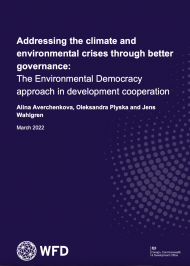
While science is clear on the urgency, impacts and the range of technological and policy solutions, political systems have lagged to produce the decisive action required to address adequately climate change and environmental degradation. Climate change crises and environmental degradation are therefore to a large extent consequence of governance and political failures. Lack of political will and political commitment, short-termism, vulnerability of policies to electoral cycles, weak accountability for implementation are some examples of such failures. Not accounting for governance failures and political economy factors undermines technocratic programmes on climate change and the environment.
This study explores the potential for development cooperation to help address climate change and environmental degradation through greater focus on environmental governance. We review the debate on the relationship between the interventions that strengthen the key pillars of governance and the environmental policy outcomes and complement it with semi-structured interviews with twenty foreign aid experts to understand the current practice, barriers to and opportunities for scaling up such interventions as part of development cooperation. The key messages are presented in this summary, while the full study will be published in May 2022, integrating the discussions at the conference on Environmental democracy taking place on 29-31 March 2022.




